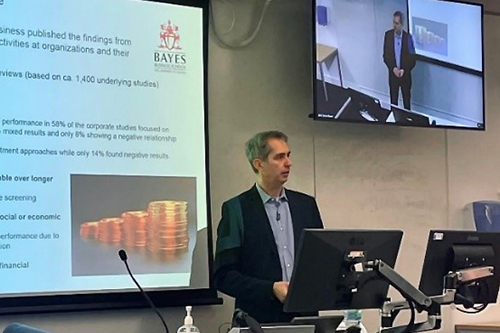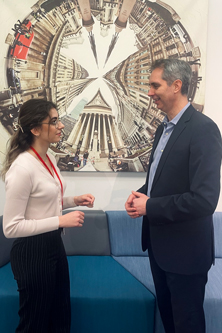What are the consequences of accelerating ESG?
Although Environmental, Social and Governance Standards (ESG) has reasonably become a top priority for emerging markets, the rapid acceleration leads to lengthy discussions and debates among stakeholders concerning the potential adverse developments.
Hi, my name is Chrysovalanto Loizidou and few weeks ago, we had the privilege to host an event for the Actuarial, Insurance, Risk and Quants (AIR-Q) society at Bayes Business School where Patrick M. Liedtke, Managing Director at BlackRock and Honorary Visiting Professor at Bayes, shared his expertise on the environmental hazards from two perspectives: the insurance participation and the investment implications.
As both an MSc Actuarial Science student at Bayes and communication officer for the Actuarial, Insurance, Risk and Quants (AIR-Q) society, I can relate with the concerns of our generation and the need for a better understanding of financial markets. Thus, through my involvement with the AIR-Q society, I desire to contribute to our society’s purpose of bridging the gap between students and industry by organising seminars with professionals and providing networking opportunities to our university students.
As a future actuary who aspires to aid in the forecasting and limitation of unfortunate risks, I am pleased to be studying at a credible business school where I am learning the fundamentals of actuarial science and developing basic business analytics skills.
Historical Aspects
The first part of the presentation focused on the lengthy tradition and legacy of ESG and how it has steadily earned the attention of the insurance sector.
A worth stating historic point he underlined, was the scientific research of Munich Re published 50 years ago, which revealed for the first time the potential consequences of environmental risks in the insurance sector. However, climate changes still only became a real subject of concern, in the last 15 years. Several conferences were upheld throughout those years. Although, COP15 merits special attention, since signalled the collective willingness of insurers to contribute and be part of a wider framework of adaptation to tackle the environmental problems occurred. After COP15 in 2009, COP26 followed in 2021.

ESG and sustainable investment
ESG refers to a three-dimensional sustainability of a company:
- Environmental – the company’s engagement to be environmentally friendly
- Social – the promotion of inclusivity, diversity, and equality within a company
- Governance – the ethical responsibility of governing a company
Professor Liedtke emphasised that, “E” - environment - used to be the component that historically drove industrial actions, but now “S” and “G” are receiving greater consideration by companies. Global movements like #metoo and corporate scandals, have drawn society’s attention and resulted in significant financial consequences. Nevertheless, social pressure rationally has become a key motivation for companies to set more net-zero targets.
ESG and Insurance
According to Patrick M. Liedtke these are the key takeaways and implications of COP26 and insurance:
- Collective acknowledgement that society needs to adapt and enhance its resilience in climate changes with insurers affirming their willingness to support by introducing schemes.
- The International Sustainability Standards Board (ISSB) will be established, aiming to create global baseline standards for sustainability reporting.
- Both private and public sector are mobilising for an instant transition to net zero projects offering insurers new investment and risk management opportunities.
- Further rules for carbon trading will be imposed, allowing insurers to offer innovative plans for technological solutions.
- Insurance companies have indicated their intensive fear that a wave of strategic litigation may occur in case of failure of COP26.

Market effects of a large movement of sustainable assets
The acknowledge that climate risks are also investment risks is leading to a gradual reallocation of the capital from problematic to sustainable investments, with financial markets been steadily reshaped and their long-term variability been questioned due to the linked portfolio diversification restriction.
Therefore, a question arises: Does this work for investments?
Patrick M. Liedtke as an expert in the field and answered us by comparing the data between the annual performance of MSCI World ESG and MSCI World. Even though, the improvement of the overall return of ESG funds appeared marginal before 2021, Covid-19 assured their superior resilience by generating a substantial difference in losses between the two categories during and after the pandemic. Likewise, the research paper published in 2021 by NYU Stern Centre for Sustainable Business gains a great relevance, since it highlights the positive correlation between ESG and financial performance.
What next?
At the end of the presentation, Patrick M. Liedtke expressed an important long-term concern regarding the acceleration of ESG flows. As long as the flow is positive and accelerating, ESG assets will experience an upward price effect, and will lead eventually to an equilibrium which ESG will continue to outperform. However, after a certain point, a decelerating scenario will emerge, in which non-ESG assets will attract investors’ interest with a possible opposite outcome being obtained.

Following the presentation, in-person and online attenders, had the opportunity to participate in an open discussion where several concerns were expressed. The overall outcome of the discussion was that ESG investing has a vital value for insurance industry since it minimises business risks and protects assets better, but nevertheless, more regulations and legislation should be imposed, to encounter the future challenges and ensure its long-term viability.
Thank you!
Follow AIR-Q society to join us for future events:
The founder and presidents of AIR-Q society (Peter V (PhD Actuarial Science), Alistair Lyons (MSc Actuarial Management), Leah Shahzad (BSc Actuarial Science), Chrysovalanto Loizidou (MSc Actuarial Science), Von Ting Yee (MSc Actuarial Science) , Mohammed Rahman (MSc Mathematical Trading and Finance ), Mahesh Iyer (MSc Insurance and Risk Management), Jean-Sebastien Verret (MSc Mathematical Trading and Finance), Jasper J. Pittam (BSc Actuarial Science), Shreya N. Totla (MSc Actuarial Management), Kinjal Dalal (MSc Actuarial Management), Flavia Caushi (BSc Actuarial Science) would like to thank Bayes, the Business School careers and events team for their help in setting up a successful event. Many thanks to the participants, and especially the speaker for his knowledge sharing session regarding the acceleration of ESG in the insurance industry. We hope to host such events of high quality in the future.